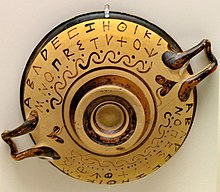Rho
 | ||||||||||||||||||||||||||||||||||||||||||||||||
| Greek alphabet | ||||||||||||||||||||||||||||||||||||||||||||||||
|---|---|---|---|---|---|---|---|---|---|---|---|---|---|---|---|---|---|---|---|---|---|---|---|---|---|---|---|---|---|---|---|---|---|---|---|---|---|---|---|---|---|---|---|---|---|---|---|---|
|
||||||||||||||||||||||||||||||||||||||||||||||||
| History | ||||||||||||||||||||||||||||||||||||||||||||||||
|
||||||||||||||||||||||||||||||||||||||||||||||||
| Diacritics and other symbols | ||||||||||||||||||||||||||||||||||||||||||||||||
| Related topics | ||||||||||||||||||||||||||||||||||||||||||||||||
Rho (/ˈroʊ/; uppercase Ρ, lowercase ρ or ϱ; Greek: ρο or ρω) is the seventeenth letter of the Greek alphabet. In the system of Greek numerals it has a value of 100. It is derived from Phoenician letter res ![]() . Its uppercase form uses the same glyph, Ρ, as the distinct Latin letter P; the two letters have different Unicode encodings.
. Its uppercase form uses the same glyph, Ρ, as the distinct Latin letter P; the two letters have different Unicode encodings.
Uses
[edit]
Greek
[edit]Rho is classed as a liquid consonant (together with Lambda and sometimes the nasals Mu and Nu), which has important implications for morphology. In both Ancient and Modern Greek, it represents an alveolar trill IPA: [r], alveolar tap IPA: [ɾ], or alveolar approximant IPA: [ɹ].
In polytonic orthography, a rho at the beginning of a word is written with a rough breathing, equivalent to h (ῥ rh), and a double rho within a word is written with a smooth breathing over the first rho and a rough breathing over the second (ῤῥ rrh). That apparently reflected an aspirated or voiceless pronunciation in Ancient Greek, which led to the various Greek-derived English words starting with rh or containing rrh.
The name of the letter is written in Greek as ῥῶ (polytonic) or ρω/ρο (monotonic).
Other alphabets
[edit]Letters that arose from rho include Roman R and Cyrillic Er (Р).
Mathematics and science
[edit]The characters ρ and ϱ are also conventionally used outside the Greek alphabetical context in science and mathematics.
- In the physical sciences to represent:
- Densities: mass density, air density or charge density (ρ)
- Resistivity (ρ)
- Rho meson (ρ+, ρ−, ρ0)
- General quantum states
- Hammett Equation, ρ is used to represent the reaction constant, this is independent of the position and nature of the substituents of the benzene ring.
- In mathematics to represent:
- A length coordinate in polar, cylindrical, spherical, and toroidal coordinate systems, and toroidal and poloidal coordinates of the Earth's magnetic field.
- The correlation coefficient of a population parameter
- The spectral radius of a matrix denoted as
- The plastic ratio
- The prime constant
- The sensitivity to interest rates of a pricing function
- The expected return of a given policy () in reinforcement learning, denoted
- The rename operation in relational algebra
- In economics to represent the discount rate of future pence cash flows
- In molecular biology to represent the Rho protein responsible for termination of RNA synthesis. In such occasions, it is often represented as U+03F1 ϱ GREEK RHO SYMBOL, to avoid confusion with the Latin letter p
- In molecular biology to represent the Rho family of GTPases, important for cytoskeletal dynamic regulation.
- In ecology to represent the population damping ratio where ρ = λ1 / |λ2|.
- In computer programming
- The lower-case rho "⍴" means reshape in the APL programming language, and by extension also queries shape
- The lower-case rho "ρ" is used for the unary rename operation in relational algebra
- In statistics to represent Spearman's rank correlation coefficient, commonly known as Spearman's rho
- In options theory to represent the rate of change of a portfolio with respect to interest rates
Chi Rho (☧)
[edit]
The letter rho overlaid with chi forms the Chi Rho symbol, used to represent Jesus Christ. It was first used by Emperor Constantine the Great. A can be seen on his standard known as the Labarum.
Rho with stroke (ϼ)
[edit]The rho with a stroke through its tail is used for abbreviations involving rho, most notably in γϼ for γράμμα as a unit of measurement.[1]
Unicode
[edit]- U+03A1 Ρ GREEK CAPITAL LETTER RHO (Ρ)[2]
- U+03C1 ρ GREEK SMALL LETTER RHO (ρ)
- U+03F1 ϱ GREEK RHO SYMBOL (ϱ, ϱ)
- U+03FC ϼ GREEK RHO WITH STROKE SYMBOL
- U+1D29 ᴩ GREEK LETTER SMALL CAPITAL RHO
- U+1D68 ᵨ GREEK SUBSCRIPT SMALL LETTER RHO
- U+1FE4 ῤ GREEK SMALL LETTER RHO WITH PSILI
- U+1FE5 ῥ GREEK SMALL LETTER RHO WITH DASIA
- U+1FEC Ῥ GREEK CAPITAL LETTER RHO WITH DASIA
- U+2374 ⍴ APL FUNCTIONAL SYMBOL RHO
- U+2627 ☧ CHI RHO
- U+2CA2 Ⲣ COPTIC CAPITAL LETTER RO
- U+2CA3 ⲣ COPTIC SMALL LETTER RO
- U+2CE5 ⳥ COPTIC SYMBOL MI RO
- U+2CE6 ⳦ COPTIC SYMBOL PI RO
- U+2CE8 ⳨ COPTIC SYMBOL TAU RO
- U+2CE9 ⳩ COPTIC SYMBOL KHI RO
- U+101A0 𐆠 GREEK SYMBOL TAU RHO
These characters are used only as mathematical symbols. Stylized Greek text should be encoded using the normal Greek letters, with markup and formatting to indicate text style:
- U+1D6B8 𝚸 MATHEMATICAL BOLD CAPITAL RHO
- U+1D6D2 𝛒 MATHEMATICAL BOLD SMALL RHO
- U+1D6E0 𝛠 MATHEMATICAL BOLD RHO SYMBOL
- U+1D6F2 𝛲 MATHEMATICAL ITALIC CAPITAL RHO
- U+1D70C 𝜌 MATHEMATICAL ITALIC SMALL RHO
- U+1D71A 𝜚 MATHEMATICAL ITALIC RHO SYMBOL
- U+1D72C 𝜬 MATHEMATICAL BOLD ITALIC CAPITAL RHO
- U+1D746 𝝆 MATHEMATICAL BOLD ITALIC SMALL RHO
- U+1D754 𝝔 MATHEMATICAL BOLD ITALIC RHO SYMBOL
- U+1D766 𝝦 MATHEMATICAL SANS-SERIF BOLD CAPITAL RHO
- U+1D780 𝞀 MATHEMATICAL SANS-SERIF BOLD SMALL RHO
- U+1D78E 𝞎 MATHEMATICAL SANS-SERIF BOLD RHO SYMBOL
- U+1D7A0 𝞠 MATHEMATICAL SANS-SERIF BOLD ITALIC CAPITAL RHO
- U+1D7BA 𝞺 MATHEMATICAL SANS-SERIF BOLD ITALIC SMALL RHO
- U+1D7C8 𝟈 MATHEMATICAL SANS-SERIF BOLD ITALIC RHO SYMBOL
See also
[edit]References
[edit]- ^ Paul of Aegina explains conventional usage in the last chapter of Book VII on weights and measures and uses it throughout his work.
- ^ Unicode Code Charts: Greek and Coptic (Range: 0370-03FF)




